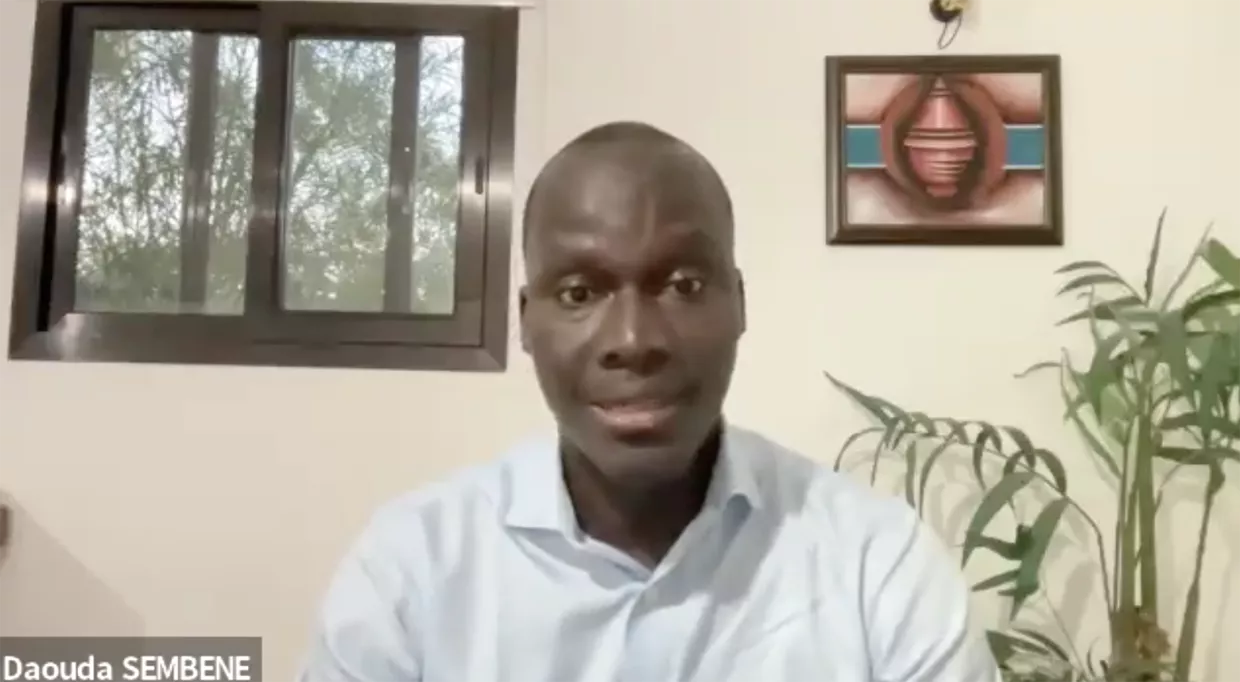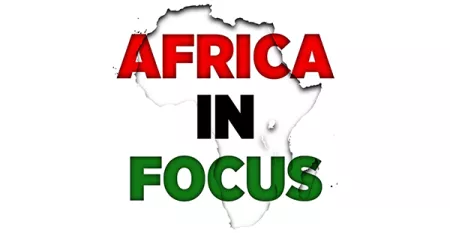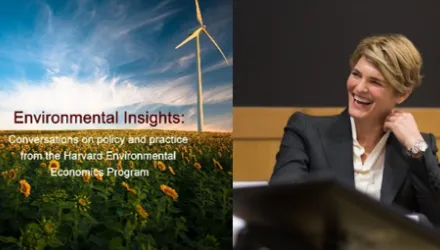
Report on the Africa in Focus Series for the 2022-2023 Academic Year
Africa consists of 54 sovereign countries, each with its unique needs and capabilities, yet climate change poses a shared threat to the continent and thus requires a degree of continent-wide coordination to successfully confront the challenges posed by a changing environment. While the continent contributes less than 3% of green-house emissions, it faces disproportionate impacts on environmental, economic, and humanitarian well-being because of climate-related effects.
“The continent is ready and open for business”
Muthoni Nduhiu, African Development Bank
In view of COP27 hosted by Egypt in 2022, the thematic focus of the Belfer Center’s Africa in Focus series for the 2022-2023 academic year was African Agency in International Climate Policy and Energy Geopolitics. The series engaged African and global policymakers in discussion about the continent’s unique challenges and opportunities in addressing the global climate change crisis.
Africa's Priorities in the Global Climate Conversation
While climate change poses a global threat, African countries face unique challenges in adapting to severe weather events, sourcing financing to protect their communities and economies from natural disasters and coordinating with multilateral institutions to build state capacity against future disasters. Speakers throughout the series highlighted the continent’s need for regional and global collaboration in addressing these policy priorities noting that while the challenges may be particular to Africa, tackling them is to the benefit of the entire international community.
1. Resilience through adaptation
Whether building flood mitigation infrastructure, early warning systems, or switching to drought-resistant agriculture, adaptation measures can help African states safeguard their communities and economies from increasingly frequent severe climate events. The United Nations defines climate adaptation as “adjustments in ecological, social or economic systems in response to actual or expected climatic stimuli and their effects” (UNFCC). As climate change accelerates, it is imperative that African states ‘adapt’ for a more resilient response to climate vulnerabilities. The African continent is already experiencing severe climate events and seasonal weather disruptions that threaten environmental, humanitarian, and economic development. One-third of the world’s droughts occur in Africa and in the past two years East Africa has witnessed its most severe droughting in over four decades. In discussions ahead of COP27, Alice Ruhweza, Africa Regional Manager for the World Wildlife Fund (WWF), stressed the importance of African states’ collaboration to work for greater climate resilience and adaptation support from the global community.
2. Securing climate finance

Securing adequate climate finance – funding drawn from public or private resources at the local, national, or transnational level to combat the effects of climate change – remains the biggest challenge for African states. It is estimated that by 2030, Africa will need on average $250B annually to effectively adapt and mitigate the impact of climate change. Currently, there are only about $30B of climate finance flowing annually into the continent, accounting for only 12% of the needed funding (CPI 2022). Panelists discussed a key challenge toward attracting more private sector investments from foreign partners stems from a disconnect between the perceived risk and real risk of investing in public and private development projects in Africa, and the uncertain returns on climate-focused projects.
3. Overcoming coordination and scaling inefficiencies
Coordination challenges are apparent not only between African states, but also among multilateral institutions engaged in climate adaptation projects on the continent. Limited resources, capacity challenges, and information asymmetry further complicates regional implementing agencies from effectively delivering on necessary policy support and sharing best practices across the continent. While there are several programs and initiatives from multilateral institutions to support the continent in its climate adaptation efforts, disparate financing schemes, fragmented project focus areas, and lack of coordination prevent a more robust and integrated strategy to help states meet their climate adaptation needs.
Looking Ahead
Across all sessions in the series, practitioners and policymakers echoed the importance of greater coordination, access to financing, and technology innovations for Africa to address climate change. Globally, more economically developed nations, especially those that contributed the most to climate change, must meet their responsibility of supporting African states to develop and implement solutions suitable and sustainable to their climate adaptation needs. While the threat of climate change is shared by all, Africa faces some of the most severe consequences. Yet, through intra-continental cooperation and intentional global partnerships, it can be a model of the world’s most innovative and successful approaches to combat climate change.
1. Improve transparency and accountability mechanisms to encourage investments in climate finance
Combat perceived risk to investment: Public financing alone will not meet the funding needs for climate adaptation, yet private investment is stifled due to perceptions of heightened risk when investing in the continent. Reducing information asymmetry by providing transparent assessments of development projects and their expected returns, implementing accountability guidelines at all levels of government, and providing a mixture of private and public funding can serve to alleviate concerns among private investors about funding climate projects on the continent.
“As far as African countries are concerned, there is a tendency to have a risk perception that is a little bit exaggerated and that is not explained by real fundamentals."
Daouda Sembene, AfriCatalyst Global Development Advisory

Strengthen regional and continental coordination on financing: Successful implementation of the African Continental Free Trade Agreement (AfCFTA) offers an opportunity for the continent to better coordinate financing mechanisms within and throughout countries to support public investments in climate resilient development and infrastructure projects. The policy changes associated with AfCFTA, including the establishment of a single-market and more fluid trade borders, would further incentivize foreign and private investment on the continent and allow for greater competition and innovation for climate focused investment.
“One of the biggest tragedies of our [intra-Africa] trading system is that we trade very little…There’s a lot of opportunity for shortening supply chains for food and increasing intra-Africa trade and of course economic prosperity.”
Wanjira Mathai, World Resources Institute
2. Work with global partners to achieve universal energy access
Focus less on decarbonizing and more on energy access: Panelists agreed that the ‘energy transition’ for Africa is less about decarbonizing and more on securing universal energy access and sufficient energy resources for economic use. An estimated 900M Africans do not have access to clean cooking energy, while 600M have no energy access at all (African Development Bank). Global considerations for the continent must be made to account for some carbon-based fuel use in the near-term, while continuing to support and invest in cleaner energy sources for the long-term.
Explore new approaches to global partnerships: Geopolitical competition among foreign powers must not limit Africa’s opportunity to secure foreign partnerships to develop clean and reliable energy infrastructure. Partnerships built on mutual gain between foreign and African countries, and prioritizing the development of sustainable energy systems, rather than one-off projects, offer greater long-term success and return on investment for all parties.
3. Invest in local talent and technology to maximize efficient adaptation measures
“There’s a combination of supply side measures and demand side measures that have to work in tandem… We have to catch up with the technological cutting edge because the technology does exist for us to be able to manage our water much, much smarter than we do now.”
Dhesigen Naidoo, South Africa Presidential Climate Commission
Better manage energy demands: Managing domestic energy and natural resource infrastructure is crucial for African states to meet the humanitarian and economic development needs of their societies. New technologies and digital tools can help leaders more effectively understand the need, usage, and distribution of critical resources and allocate those resources more efficiently.
Optimize local solutions to address local problems: Africa is home to some of the world’s most robust and entrepreneurial tech start-up ecosystems, offering local solutions to everything from improving agricultural output to developing smarter, cleaner access to electricity. Concurrent with seeking external partnerships, continental leaders should invest in the development and cultivation of local start-ups and businesses at the intersection of technology and climate adaptation. Investment in these ventures not only spurs local economic growth but allow for innovative solutions tailored to local needs.

Africa in Focus
The Africa in Focus series is a forum for the intellectual and critical analysis of processes and policies from the continent and its engagement with the international community. Through thoughtful and dynamic programming, Africa in Focus brings greater African perspectives into broader policy conversations at HKS.
Diallo, Kadijatou. “African Agency in International Climate Policy and Energy Geopolitics .” Edited by Colbert, Natalie. Belfer Center for Science and International Affairs, Harvard Kennedy School, May 30, 2023







